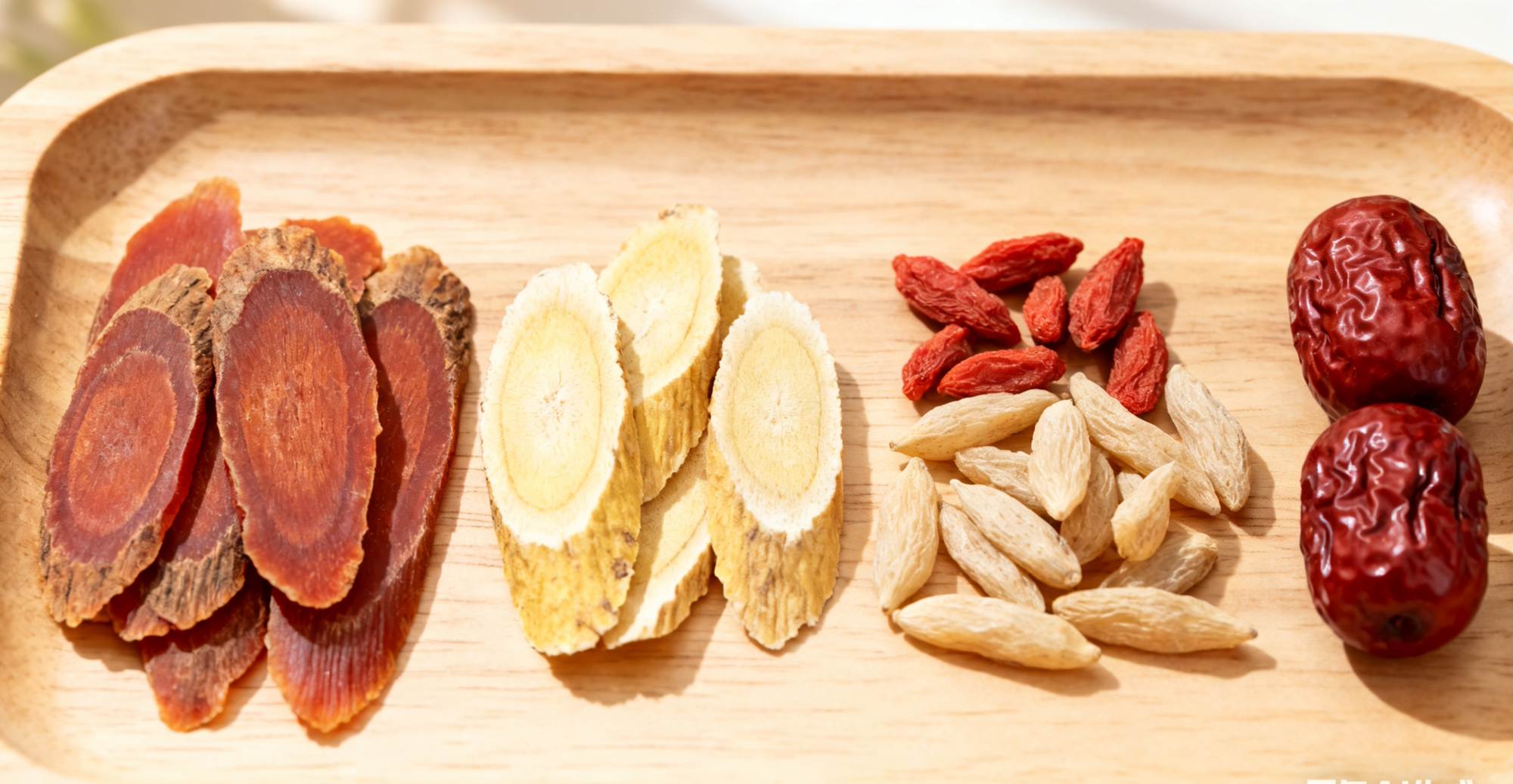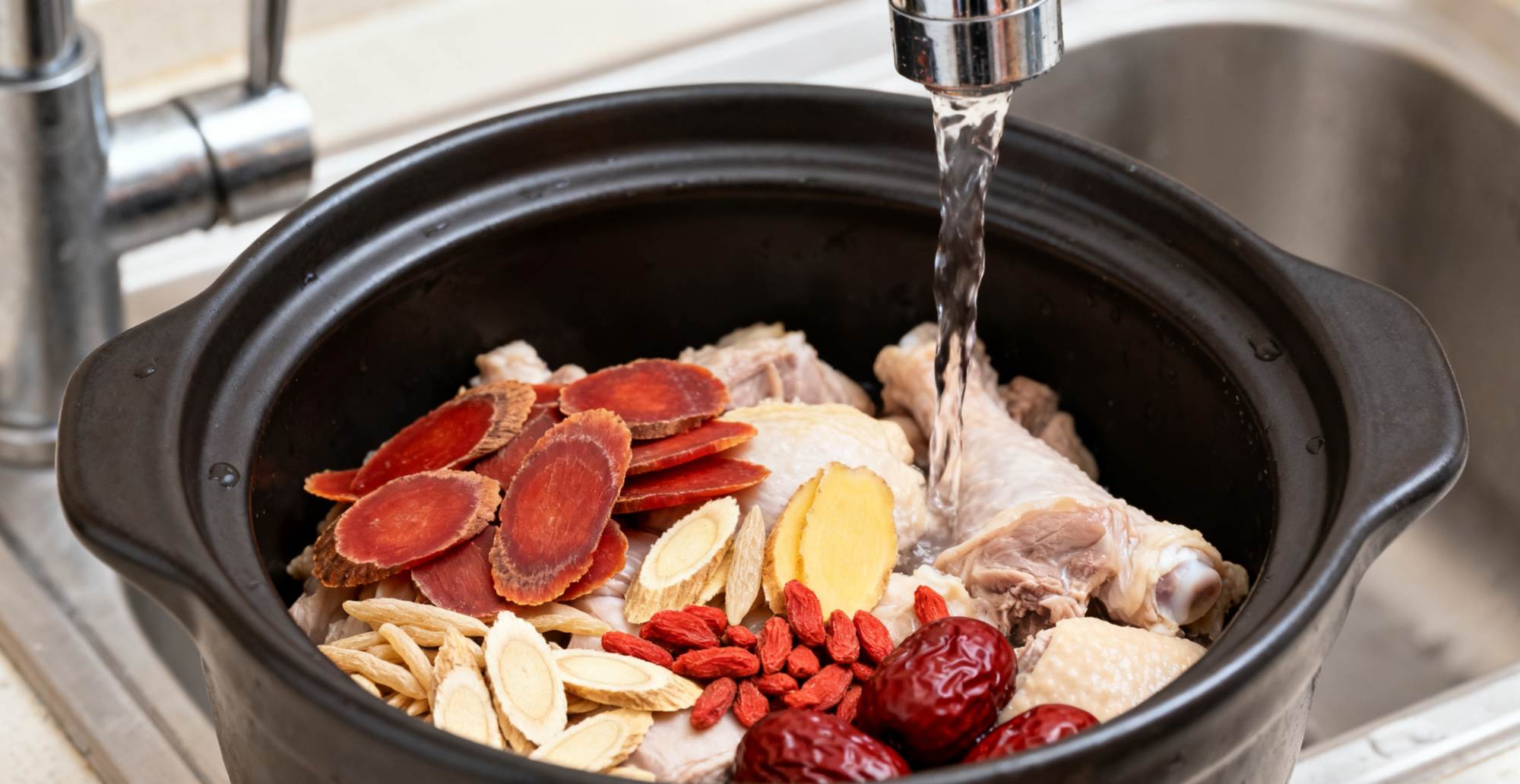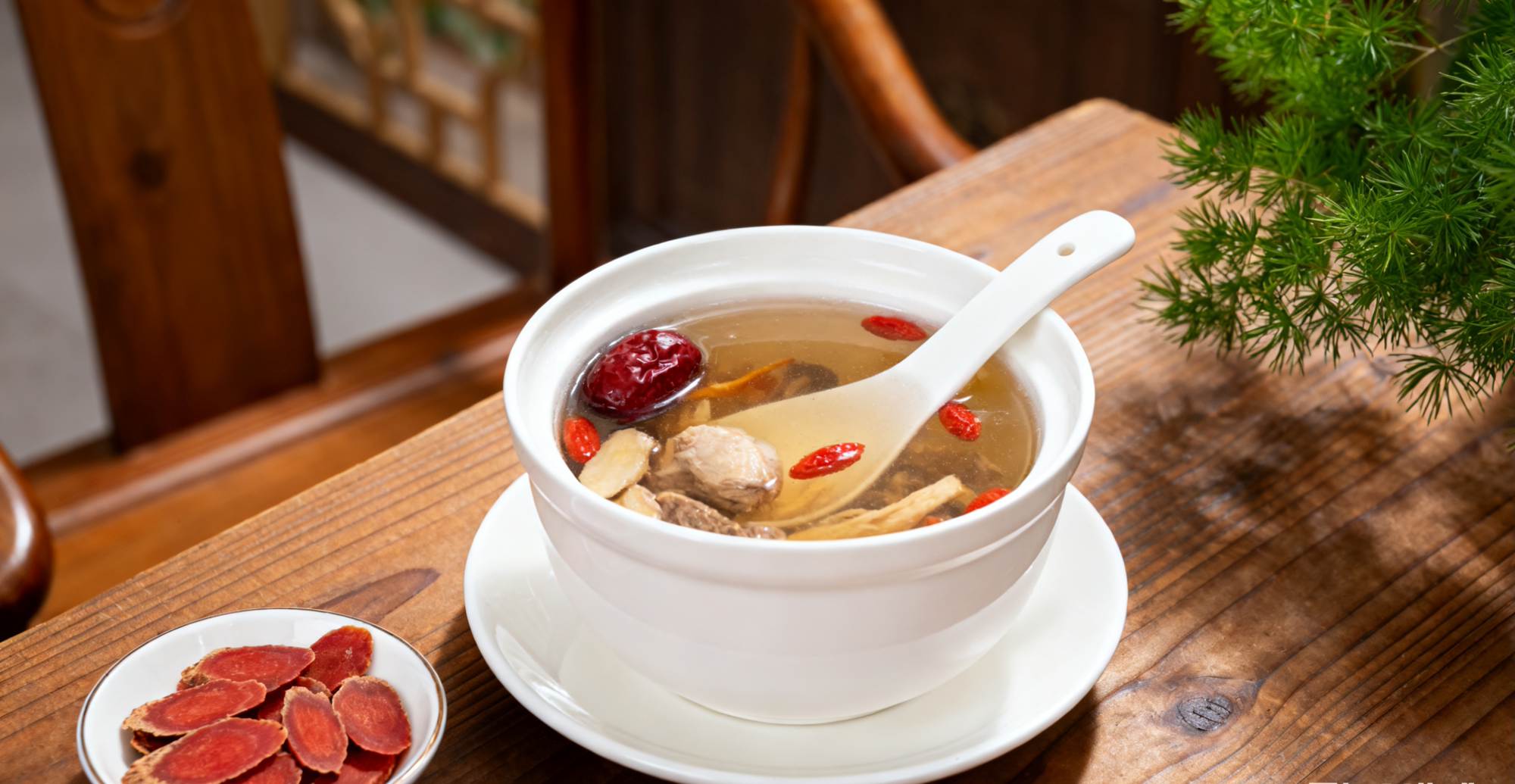Astragalus, Goji Berry, Ophiopogon japonicus, Red Ginseng, and Red Date Soup
content
I. Preparation of Medicinal Herbs
1.1 Red Ginseng
1.2 Astragalus
1.3 Goji Berries
1.4 Ophiopogon japonicus
1.5 Red Dates
II. Nourishing the Body with Soup
2.1 Greatly Replenishes Vital Energy
2.2 Nourishes Yin and Yang
2.3 Nourishes Blood and Calms the Mind
2.4 Nourishes the Liver and Kidneys
2.5 Moistens the Lungs and Promotes Body Fluid Production
III. Soup Recipe and Consumption Guide
3.1 Ingredient Combinations (Serves 2-3)
3.2 Preparation Steps
3.3 Suitable Population
3.4 Precautions
IV. Traditional Chinese Medicine Diagnosis
4.1 Fear of Cold and Cold Limbs
4.2 Pale Complexion
4.3 Chronic Cough Due to Lung Deficiency
4.4 Loose Stools Due to Spleen Deficiency
I. Preparation of Herbs
The Golden Rule of Traditional Chinese Medicine Tonification: Traditional Chinese medicine believes that "Qi is the commander of blood, and Yin is the foundation of Yang." This soup focuses on replenishing Qi, nourishing Yin, and nourishing blood, with a subtle and ingenious combination of herbs.
1.1 Red Ginseng
Warm in nature, sweet and slightly bitter in taste, it enters the spleen, lung, and heart meridians. It can greatly replenish vital energy, restore pulse, and consolidate the body, making it a "powerhouse" for replenishing Qi and strengthening Yang.
1.2 Astragalus
Slightly warm in nature, sweet in taste, it is good at replenishing the Qi of the spleen and stomach, consolidating the exterior, and stopping sweating. When used with red ginseng, it enhances the Qi-replenishing power.
1.3 Goji Berry
Neutral in nature, sweet in taste, it enters the liver and kidney meridians. It can nourish the liver and kidneys, benefit essence and improve eyesight, and has the effect of balancing Yin and Yang.
1.4 Ophiopogon japonicus
Slightly cold in nature, sweet and slightly bitter in taste, it nourishes yin and moistens the lungs, benefits the stomach and promotes the production of body fluids, balancing the warming and drying properties of red ginseng and astragalus.
1.5 Red Dates
Warm in nature, sweet in taste, they enter the spleen and stomach meridians, tonifying the middle jiao and replenishing qi, nourishing blood and calming the mind, harmonizing other herbs and adding sweetness. The five herbs, with their balanced warming and cooling properties, work together to tonify qi and consolidate the body, nourish yin and blood, and harmonize yin and yang, suitable for those with weak constitution, fatigue, and insufficient qi and blood to nourish themselves in autumn and winter.

II. Nourishing Life Through Soup
2.1 Greatly Replenishing Vital Energy
Improving Severe Qi Deficiency: The powerful combination of red ginseng and astragalus significantly improves symptoms of qi deficiency such as shortness of breath, lethargy, weakness in the limbs, sweating upon exertion, and rectal prolapse, suitable for those recovering from serious illness or surgery to quickly regain strength.
2.2 Nourishing Yin and Boosting Yang
Balancing Yin and Yang Imbalance: Goji berries gently nourish the liver and kidneys, while Ophiopogon japonicus nourishes Yin and moistens dryness. This can alleviate dry mouth and throat caused by excessive warming and dryness in those with Yang deficiency. It also assists red ginseng and astragalus in enhancing the Yang-boosting effect, making it especially suitable for those with Yin and Yang deficiency experiencing aversion to cold, cold limbs, and hot flashes in the palms, soles, and chest.
2.3 Nourishing Blood and Calming the Mind
Regulating Heart Blood Deficiency: Red dates nourish blood, Ophiopogon japonicus clears the heart, and red ginseng replenishes heart Qi. This has an auxiliary regulating effect on symptoms of heart blood deficiency such as palpitations, insomnia, forgetfulness, excessive dreaming, and sallow complexion. It is suitable for those engaged in long-term mental work and menopausal women.
2.4 Nourishing the Liver and Kidneys
Protecting the Health of Essence and Blood: Goji berries enter the liver and kidney meridians, benefiting essence and replenishing marrow. Combined with red ginseng to replenish Qi, it can improve symptoms of liver and kidney deficiency such as lower back and knee weakness, dizziness, tinnitus, and premature graying of hair. It is especially suitable for middle-aged and elderly people with liver and kidney deficiency.
2.5 Lung-Nourishing and Fluid-Generating
Relieves Dry Cough and Sore Throat: Ophiopogon japonicus nourishes yin and moistens the lungs, while goji berries moisten dryness. This combination can relieve dry cough with little phlegm and dry, itchy throat caused by lung dryness. Combined with red ginseng to replenish qi and enhance the lungs' disease resistance, it is suitable for consumption during the dry autumn and winter seasons.
III. Soup Recipe and Consumption Guidelines
3.1 Ingredients (Serves 2-3)
- Main Ingredients: 5-8g red ginseng (sliced), 15g astragalus root, 12g goji berries, 10g ophiopogon root, 5-6 pitted red dates
- Side Ingredients: 250g chicken/ribs (optional), 3 slices of ginger

3.2 Cooking Steps
1. Wash the herbs and remove the pits from the red dates; blanch the meat to remove blood and impurities, then set aside.
2. Add 1500-2000ml of water to a clay pot, add all ingredients, bring to a boil over high heat, then simmer over low heat for 1.5-2 hours.
3. Season with salt, and enjoy the soup and ingredients while hot (chewing the red ginseng enhances its medicinal effects).

3.3 Suitable Population
Those with severe Qi deficiency (e.g., low blood pressure, fatigue, fainting) or Yang deficiency (cold limbs, frequent urination with clear urine)
Those who need rapid replenishment of vital energy after illness or surgery;
Middle-aged and elderly people whose Qi and blood are gradually declining and who need to replenish both Yin and Yang;
Office workers who suffer from both Qi and Yin deficiency due to long-term sleep deprivation and high stress.
3.4 Precautions
Those with a constitution prone to heat (bitter taste in the mouth, bad breath, constipation, dark urine, red tongue with yellow coating) or those with fever due to a cold are strictly prohibited from drinking this, as it may exacerbate heat and generate internal fire; - Red ginseng has a strong medicinal effect, and the dosage should not exceed 10 grams. Those with Yin deficiency and excessive internal fire can use 6-8 grams of American ginseng instead to reduce its warming and drying properties; - Pregnant women, breastfeeding women, and children under 14 years of age should use this with caution and are advised to consult a traditional Chinese medicine practitioner before consumption; - Avoid consuming raw, cold, or greasy foods during the consumption period to avoid affecting the absorption of the medicine.
IV. Traditional Chinese Medicine Differentiation
Adjustments based on individual constitution for more precise results
4.1 Cold intolerance and cold limbs
Add 3g of cinnamon and 10g of epimedium to enhance warming and dispelling cold effects;
4.2 Pale complexion
Add 6g of angelica and 12g of rehmannia to strengthen blood-nourishing and replenishing effects;
4.3 Lung deficiency and chronic cough
Add 15g of lily bulb and 12g of adenophora stricta for better lung-moistening and cough-relieving effects;
4.4 Spleen deficiency and loose stools
Add 12g of stir-fried atractylodes macrocephala and 15g of poria cocos to strengthen the spleen and stop diarrhea, preventing the tonic from harming the stomach.
This soup has strong nourishing properties. It is recommended to drink it 1-2 times a week. After two weeks of continuous use, take a 3-5 day break before continuing to avoid excessive nourishment leading to internal heat. If symptoms such as dry mouth and tongue, or nosebleeds occur, discontinue use and boil with 15g of ophiopogon japonicus and 6g of chrysanthemum to alleviate the symptoms.
A bowl of nourishing soup, blending red ginseng and other medicinal herbs, embodies the wisdom of traditional Chinese medicine's principle of "tonifying what is deficient," and is also a comforting choice for modern people to combat fatigue and regulate their Qi and blood. Following the seasons and tailoring meals according to individual conditions, let health begin with a bowl of soup, revitalizing you from the inside out.



